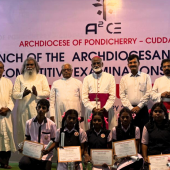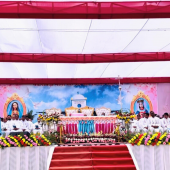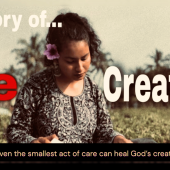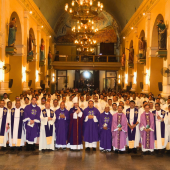Indian Capuchin conferred with lifetime achievement award by Federal Government
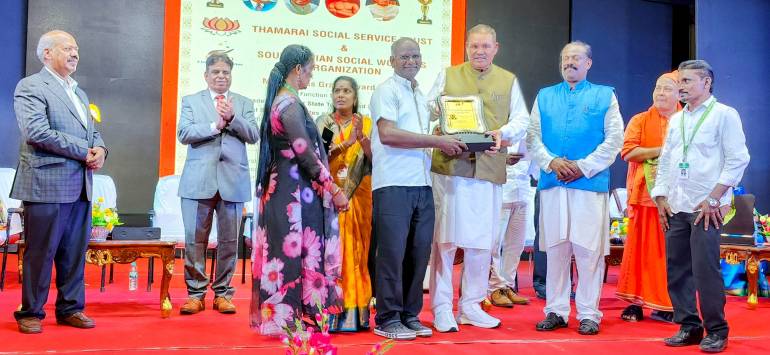
Father Nithiya Sagayam (OFM.Cap), an Indian Capuchin Franciscan and social activist, was conferred with a lifetime achievement award from the Ministry of Social Justice and Empowerment of the federal government on June 15.
The event took place at Raja Sir Annamalai Mandram, Chennai, the capital of the south Indian state of Tamil Nadu.
The "Atal Bihari Vajpayee Lifetime Achiever Award" is named after the former Indian Prime Minister (1924–2018).
Presently, Sagayam is at the Thalir Solanus Casey Center in a rural area near Villupuram in Tamil Nadu, south India.
The lifetime achievement award was given to a select group of 17 people from various parts of India. It was a long and tedious process for those involved in the social uplift of the poor and marginalized.
Each received a trophy with a citation on it.
Ramdas Athawale, the Federal Minister of State for Social Justice and Empowerment, presented the award. The other guest was the chairman of the National Commission for Scheduled Castes (NCSC), Vijay Sampla.
"My credentials are due to my special focus on carrying out the Supreme Court Order on Food Security in 15 states in 10 languages to reach out to the marginalized people, the rural poor, the slum dwellers, and migrants," Father Sagayam told RVA News.
His activities are related to the rights of women, children, and the rural poor, his contribution to global peace at the United Nations Organization, the World Council of Churches and Dialogue, and his advocacy for social justice and human rights.
He lives amidst the rural poor with a special focus on their welfare, especially the Gypsies and primitive tribal Irular communities.
The priest is known for motivating the disadvantaged, training social activists, and organizing programs on peacebuilding.
During COVID-19, he launched international online programs in 43 countries, covering more than 46,000 participants.
He has a master's degree in Gandhian philosophy and another in human rights. His M.Phil. is in peace science, and his Ph.D. is in interreligious relations.
He was secretary of the International Commission for Justice and Peace of the Capuchin Order in Rome for five years.
He was the director of the Office of Justice, Peace, and Development for the Catholic Bishops' Conference of India (CBCI) for nine years.
The priest was the executive director of the Office of Human Development of the Federation of Asian Bishops' Conferences (FABC) for four years.
He collaborates with the Pontifical Council for Justice and Peace (now known as the Dicastery for Promoting Integral Human Development) and the Pontifical Council for New Evangelization (now the Dicastery for Evangelization).
Besides becoming a lobbyist for the Arms Trade Treaty (ATT) in the UN Committee for Disarmament, he organized several national and international workshops on social advocacy. He also served on the Board of Directors of the Ecumenical Advocacy Alliance under the World Council of Churches (WCC, Geneva).
He has been the national coordinator of the Association of Franciscan Families of India (AFFI) for the last 11 years, overseeing several federal programs annually.
When the Government of India came up with the Food Security Act (2013), it did not reach out to the oppressed, such as Dalits, tribals, rural poor, slum dwellers, and migrants.
Sagayam motivated them with 36 regional languages and 847 training sessions held in 15 Indian states, publishing user-friendly guidelines in 12 languages and a DVD in 12 languages. His efforts helped people succeed nationwide in getting pension schemes for older people, widows, and spinsters with 100 days of working entitlement.
Thousands of beneficiary families received their entitlements all over India.
When anti-Christian persecution erupted in 2008 between tribals and Dalits in the Kandhamal district of the eastern Indian state of Odisha, he organized relief activities and trauma counseling through a trained youth. He also retrieved the burned documents—land, houses, and certificates—from the government offices with a local team.
When COVID-19 affected society, Father Sagayam went to remote villages in several districts with a team of Capuchins to give provisions and medicines to gypsies, primitive tribal people, and the rural poor.
In the Villupuram district of Tamil Nadu, one of the least developed tribes is the Irula, who live in extreme poverty, and the children live with low self-esteem.
Hence, he covered 50 unreachable villages with a team to motivate parents and children for a better future, focusing on many aspects.
The Irula community always lived scattered among four to five families. They are brought together in some settlements.
Sagayam has a settlement of around 100 families. This is done through food provisions, stationery, education for the children, and employment guidance for people.
Another group is the Gypsies, who usually live nomadic lives and can stay together. Along with other Capuchins, Father Sagayam organizes them for education and employment.
Besides, transgender people continue to suffer in several ways. Usually, no one visits their locality. Father Sagayam took the initiative to help them during COVID and motivate them for a better future through workshops.
Father Sagayam continued to be a catalyst in all his undertakings, making people aware of their rights and entitlements regarding their socioeconomic well-being.
Besides education and awareness, he continues to motivate them to reach their highest vision. - Santosh Digal
Radio Veritas Asia (RVA), a media platform of the Catholic Church, aims to share Christ. RVA started in 1969 as a continental Catholic radio station to serve Asian countries in their respective local language, thus earning the tag “the Voice of Asian Christianity.” Responding to the emerging context, RVA embraced media platforms to connect with the global Asian audience via its 21 language websites and various social media platforms.









